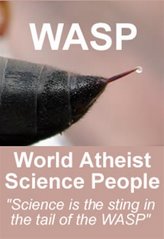reposted from RichardDawkins.net
by Sam Harris, Nature
Reposted from:
http://www.nature.com/nature/journal/v448/n7156/full/448864a.html
It was genuinely alarming to encounter Ziauddin Sardar's whitewash of Islam in the pages of your journal ('Beyond the troubled relationship' Nature 448, 131–133; 2007). Here, as elsewhere, Nature's coverage of religion has been unfailingly tactful — to the point of obscurantism.
In his Commentary, Sardar seems to accept, at face value, the claim that Islam constitutes an "intrinsically rational world view". Perhaps there are occasions where public intellectuals must proclaim the teachings of Islam to be perfectly in harmony with scientific naturalism. But let us not do so, just yet, in the world's foremost scientific journal.
Under the basic teachings of Islam, the Koran cannot be challenged or contradicted, being the perfect word of the creator of the Universe. To speak of the compatibility of science and Islam in 2007 is rather like speaking of the compatibility of science and Christianity in the year 1633, just as Galileo was being forced, under threat of death, to recant his understanding of the Earth's motion.
An Editorial announcing the publication of Francis Collins's book, The Language of God ('Building bridges' Nature 442, 110; doi:10.1038/442110a 2006) represents another instance of high-minded squeamishness in addressing the incompatibility of faith and reason. Nature praises Collins, a devout Christian, for engaging "with people of faith to explore how science — both in its mode of thought and its results — is consistent with their religious beliefs".
But here is Collins on how he, as a scientist, finally became convinced of the divinity of Jesus Christ: "On a beautiful fall day, as I was hiking in the Cascade Mountains... the majesty and beauty of God's creation overwhelmed my resistance. As I rounded a corner and saw a beautiful and unexpected frozen waterfall, hundreds of feet high, I knew the search was over. The next morning, I knelt in the dewy grass as the sun rose and surrendered to Jesus Christ."
What does the "mode of thought" displayed by Collins have in common with science? The Language of God should have sparked gasping outrage from the editors at Nature. Instead, they deemed Collins's efforts "moving" and "laudable", commending him for building a "bridge across the social and intellectual divide that exists between most of US academia and the so-called heartlands."
At a time when Muslim doctors and engineers stand accused of attempting atrocities in the expectation of supernatural reward, when the Catholic Church still preaches the sinfulness of condom use in villages devastated by AIDS, when the president of the United States repeatedly vetoes the most promising medical research for religious reasons, much depends on the scientific community presenting a united front against the forces of unreason.
There are bridges and there are gangplanks, and it is the business of journals such as Nature to know the difference.
http://www.samharris.org
http://www.nature.com/nature/journal/v448/n7156/full/448864a.html
It was genuinely alarming to encounter Ziauddin Sardar's whitewash of Islam in the pages of your journal ('Beyond the troubled relationship' Nature 448, 131–133; 2007). Here, as elsewhere, Nature's coverage of religion has been unfailingly tactful — to the point of obscurantism.
In his Commentary, Sardar seems to accept, at face value, the claim that Islam constitutes an "intrinsically rational world view". Perhaps there are occasions where public intellectuals must proclaim the teachings of Islam to be perfectly in harmony with scientific naturalism. But let us not do so, just yet, in the world's foremost scientific journal.
Under the basic teachings of Islam, the Koran cannot be challenged or contradicted, being the perfect word of the creator of the Universe. To speak of the compatibility of science and Islam in 2007 is rather like speaking of the compatibility of science and Christianity in the year 1633, just as Galileo was being forced, under threat of death, to recant his understanding of the Earth's motion.
An Editorial announcing the publication of Francis Collins's book, The Language of God ('Building bridges' Nature 442, 110; doi:10.1038/442110a 2006) represents another instance of high-minded squeamishness in addressing the incompatibility of faith and reason. Nature praises Collins, a devout Christian, for engaging "with people of faith to explore how science — both in its mode of thought and its results — is consistent with their religious beliefs".
But here is Collins on how he, as a scientist, finally became convinced of the divinity of Jesus Christ: "On a beautiful fall day, as I was hiking in the Cascade Mountains... the majesty and beauty of God's creation overwhelmed my resistance. As I rounded a corner and saw a beautiful and unexpected frozen waterfall, hundreds of feet high, I knew the search was over. The next morning, I knelt in the dewy grass as the sun rose and surrendered to Jesus Christ."
What does the "mode of thought" displayed by Collins have in common with science? The Language of God should have sparked gasping outrage from the editors at Nature. Instead, they deemed Collins's efforts "moving" and "laudable", commending him for building a "bridge across the social and intellectual divide that exists between most of US academia and the so-called heartlands."
At a time when Muslim doctors and engineers stand accused of attempting atrocities in the expectation of supernatural reward, when the Catholic Church still preaches the sinfulness of condom use in villages devastated by AIDS, when the president of the United States repeatedly vetoes the most promising medical research for religious reasons, much depends on the scientific community presenting a united front against the forces of unreason.
There are bridges and there are gangplanks, and it is the business of journals such as Nature to know the difference.
http://www.samharris.org







No comments:
Post a Comment